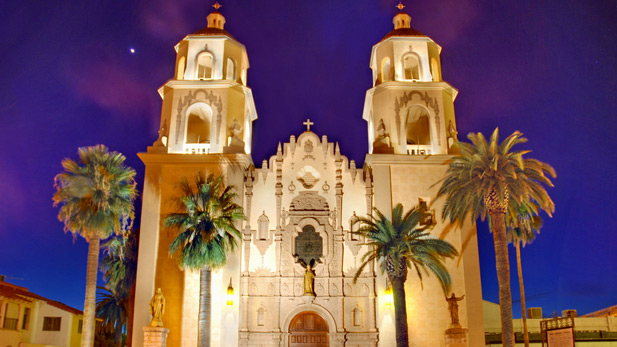 St. Augustine Cathedral in Tucson.
St. Augustine Cathedral in Tucson.Story by Kate Sheehy
Fronteras Desk
Listen:
Latino population growth in Tucson and throughout the Southwest means the Catholic community is also increasing. But there's not enough clergy, especially Spanish-speaking, to shepherd the congregations, and that has led the church to bring priests from around the world.
On this Sunday morning, Father Mom, a priest from Nigeria, begins the celebration of Mass in Spanish at St. Augustine Cathedral near downtown Tucson. This is one of dozens of masses offered in Spanish for the Diocese of Tucson.
The Center for Applied Research in the Apostolate conduct social science research on the Catholic Church. CARA reported that Latinos account for 71 percent of the growth in the Catholic population since 1960 and that nearly 40 percent of all adult Catholics in the U.S. identify as Latino.
Mary Gautier, a researcher for CARA, said while the Catholic population continues to grow, the number of priests stopped increasing in the late '60s and early 70s, and has been declining ever since.
"So there's fewer and fewer priests to serve more and more Catholics and that's a situation many dioceses are facing," she said.
Gautier said the rate of men becoming priests now is only about one-third to half as many needed to keep up with both the growth of the Catholic population, as well as the retirement or death of a large community of priests ordained in the 50s and 60s.
A recently published book Gautier co-authored looked at the trend of international priests coming to the U.S. She said there are more than 6,000 international priests and that number has more than doubled since 1999.
Back at St. Augustine Cathedral, Mom met with Bishop Gerald Kicanas. Mom left Nigeria for the first time almost two years ago, after being invited by the bishop to help out in the Diocese of Tucson. Building overseas partnerships is one way Kicanas said the diocese is trying to make up for a priest shortage.
"Just as our country sent missionaries to other countries in the 50s and 60s, now it’s kind of a reverse mission…" he said.
Kicanas said the majority of the 41 international priests serving his parishes are from Nigeria, Ghana, India and the Philippines.
"Priests from other countries are coming as missionaries to serve for which we're very grateful," he said.
In the Southwest, one of the most important challenges priests face is language.
"Many of the priests coming from other countries do not speak Spanish and one of our great needs here is for bilingual priests," Kicanas said.
Even those who speak English usually have to undergo something called “accent reduction training.”
Mom said when he arrived, he realized almost immediately that he would need a crash course in Spanish to serve the large Latino population in the region. He went to a language immersion program in Mexico.
"I almost went crazy trying to learn so much in one month, but I knew that I didn’t have the luxury of a lot time," he said.
He recalled one time he was trying to tell a Spanish teacher he was tired, which is “cansado” and instead he used the Spanish word for married “casado."
"I said thanks be to God I said that in the class, not in the town to someone who’s going to wonder what kind of priest is married," he said laughing.
Many international priests like Mom will go back to their home countries after a few years. Mom said there’s a great need for priests in Nigeria, too.

By submitting your comments, you hereby give AZPM the right to post your comments and potentially use them in any other form of media operated by this institution.